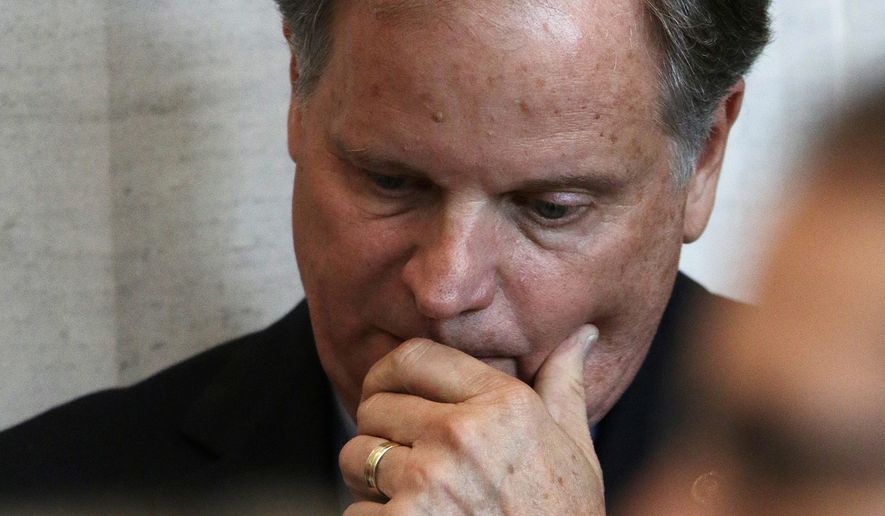While other senators’ votes got more attention, perhaps the most curious “No” vote on Justice Brett M. Kavanaugh came from Sen. Doug Jones of Alabama, a Democrat who represents one of the reddest states in the country but has been voting, at times, like a New England liberal.
After his surprise win in a special election in late 2017 some analysts had predicted Mr. Jones would join Sen. Joe Manchin III, West Virginia Democrat, as the chamber’s middle, backing Mr. Trump on some key disputes.
But those occasions have been few, and more often Mr. Jones has sided with his party’s leadership on spending cuts, immigration, abortion and those critical presidential nominations such as Justice Kavanaugh.
“He would fit perfectly in New York or California, but in Alabama he is digging his own grave,” Terry Lathan, chairwoman of the Alabama GOP, told The Washington Times. “He is dancing the wrong dance, with the wrong people, with the wrong music. He is not in step with us.”
Mr. Jones defended his record in a rebuttal statement to the Times, saying he is focused on issues that affect the state’s everyday voters — not partisan politics.
“I will continue to be an independent voice for Alabama who cares more about the issues that unite us than those that divide us — unlike Ms. Lathan who cherry-picks her facts to weave a divisive narrative and reaffirm her narrow partisan viewpoint,” Mr. Jones said.
Mr. Jones has kept a fairly low profile during his first year in the chamber and has avoided opportunities to launch anti-Trump attacks.
He points out that his first piece of legislation focused on bolstering rural health care and boasts he has fought to roll back Obama-era regulations that he said were hurting the state’s banks, to strengthen the education system and to “protect Alabama’s auto workers and farmers from unnecessary tariffs.”
His voting record is still on the more moderate side — though with several major exceptions that put him to the left of the most conservative-leaning Democrats in Mr. Manchin and Sens. Heidi Heitkamp of North Dakota and Joe Donnelly of Indiana.
He also isn’t up for re-election until 2020, helping him escape the scrutiny Ms. Heitkamp and Mr. Donnelly are facing for their votes against Justice Kavanaugh.
Speaking on the Senate floor this month, Mr. Jones blamed Mr. Trump for poisoning the Supreme Court debate and said Justice Kavanaugh hurt his own case by angrily denying accusations of sexual assault.
“In my view, he simply went too far by leveling unnecessary and inappropriate partisan attacks and accusations, demonstrating a temperament that is unbecoming a sitting judge, much less a Supreme Court nominee,” Mr. Jones said.
Michael Hoyt, chairman of the Baldwin County Republican Party in Alabama, said that stance will anger voters who backed Mr. Trump in 2016 by nearly 30 percentage points, in significant part because of his pledge to nominate conservative judges to the Supreme Court.
“One of his promises was that he would reach across the aisle and represent the people of Alabama and not necessarily toe the party line of the Democratic Party, and that is almost exactly what he has done — particularly with his votes on the abortion issue and his opposition to Justice Kavanaugh, which has really resonated with people here,” Mr. Hoyt said.
Richard Mauk, chairman of the Jefferson County Democrats in Alabama, said Mr. Jones is navigating through choppy political waters.
“We are, in tone, one of the reddest of red states so any vote that he casts is going to be trouble — regardless,” Mr. Mauk said. “If he votes for a conservative cause, the liberals are mad. If he votes for a liberal cause, the conservatives are mad.”
Indeed, Mr. Jones angered liberals by breaking with his party with that bank measure, which undid some of the Wall Street regulations put in place by the Dodd-Frank legislation signed by President Obama. Mr. Jones also supported confirmation of Mike Pompeo as secretary of state.
“I think the explanations that he gives on each of the votes he casts are well thought out; they are not politically motivated. He is not a Joe Manchin,” Mr. Mauk said. “I think he continues to vote his conviction.”
Giles Perkins, former chairman of the Alabama Democratic Party, said voters like the fact that Mr. Jones is authentic and “just a real good guy.”
“Some particular vote isn’t going to define him,” Mr. Perkins said. “He votes for what’s right, reaching across the aisle when he should, but always voting his conscience.”
Mr. Jones won election thanks to a rancorous GOP primary that nominated Roy Moore, who had a very conservative record but during the special election last year faced accusations of sexual misconduct with teenage girls while he was a lawyer in his 30s.
Sam Fisher, political science professor at the University of South Alabama, said Mr. Jones could be operating on borrowed time.
“Under normal circumstances, Sen. Jones would have lost the special election. However, with all of Roy Moore’s problems, it turned out not to be a normal election,” Mr. Fisher said. “As an incumbent, he should be favored, but I don’t think that will be the case in a presidential election year when Alabama showed such strong support for Trump in his first election.”
• Seth McLaughlin can be reached at smclaughlin@washingtontimes.com.




Please read our comment policy before commenting.